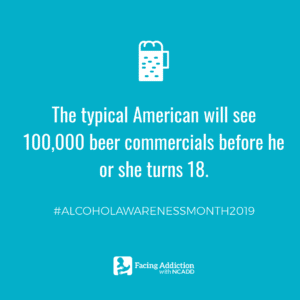 It’s Alcohol Awareness Month, founded and sponsored by The National Council on Alcoholism and Drug Dependence (now Facing Addiction with NCADD) in an effort to reduce stigma and raise awareness about the prevention and treatment of alcohol abuse and addiction. The pressure to drink alcohol is everywhere, notes Facing Addiction. One in every 12 adults, or 17.6 million people, suffer from alcohol use disorder or alcohol dependence – and it doesn’t happen overnight. Like other types of addiction, it’s a progressive disease that happens in stages. In fact, some experts say it can begin well before you pick up a drink, especially if you have a genetic predisposition. What’s worse, by the time many people realize that their recreational drinking has turned into dependence and addiction it’s too late to stop on their own. Knowing the signs and symptoms of each stage can help you know when to seek help for yourself or a loved one. Without intervention and proper treatment, alcoholism can progress to the point where it can cause serious consequences for yourself and for the ones you love.
It’s Alcohol Awareness Month, founded and sponsored by The National Council on Alcoholism and Drug Dependence (now Facing Addiction with NCADD) in an effort to reduce stigma and raise awareness about the prevention and treatment of alcohol abuse and addiction. The pressure to drink alcohol is everywhere, notes Facing Addiction. One in every 12 adults, or 17.6 million people, suffer from alcohol use disorder or alcohol dependence – and it doesn’t happen overnight. Like other types of addiction, it’s a progressive disease that happens in stages. In fact, some experts say it can begin well before you pick up a drink, especially if you have a genetic predisposition. What’s worse, by the time many people realize that their recreational drinking has turned into dependence and addiction it’s too late to stop on their own. Knowing the signs and symptoms of each stage can help you know when to seek help for yourself or a loved one. Without intervention and proper treatment, alcoholism can progress to the point where it can cause serious consequences for yourself and for the ones you love.
3 Stages of Alcoholism
Most experts classify the progression of the disease in three stages: early, middle and end/late-stage alcoholism. Stage 1: Early addiction: During this stage, you’re just building up a tolerance to alcohol; there may not be any obvious impairment or dysfunction. You will notice, however, that you need to drink larger quantities to get the same “buzz” and you may find yourself drinking consistently to deal with stress or other problems. Others around you may begin to notice something different about your behavior – but they’re not sure what. Stage 2: Middle stage: The middle stage is often characterized by the beginning of noticeable physical and social effects of drinking. For instance, during this phase, many people experience blackouts after excessive drinking as well as psychological and physical withdrawal symptoms when alcohol is not available. This includes:
- Depression
- Anxiety
- Irritability
- Fatigue
- Insomnia
- Headaches
- Nausea
- Clammy, pale skin
- Rapid heartbeat
- Excessive sweating
- Shakiness and tremors
At this point, you may also begin to struggle with work, school and family responsibilities and others around you may begin to recognize your problem drinking. Stage 3: Late or end stage: During the late or end stages of alcoholism, the disease infiltrates your physical, social, spiritual and mental health. By this point, drinking has taken a toll on your relationships with family and friends, your leisure activities and even your career. It’s also likely that you can no longer sleep with alcohol and that you experience blackouts frequently. What’s more, alcohol is beginning to wreak havoc on your body, increasing your risk for hepatitis, cirrhosis of the liver, recurring respiratory infections and pancreatitis and even heart failure.
Alcohol Intervention & Rehab in Austin
BRC Recovery works with Austin interventionists and professional alcohol and drug interventionists all over the country to help concerned family members who have a loved one abusing or chemically dependent on alcohol and/or drugs. To learn more about our intervention and recovery services, call us today: 866-461-1759.


